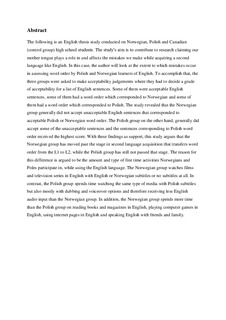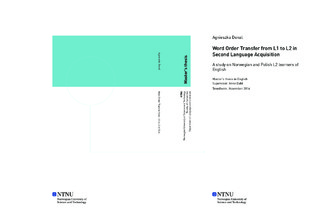| dc.description.abstract | The following is an English thesis study conducted on Norwegian, Polish and Canadian (control group) high school students. The study’s aim is to contribute to research claiming our mother tongue plays a role in and affects the mistakes we make while acquiring a second language like English. In this case, the author will look at the extent to which mistakes occur in assessing word order by Polish and Norwegian learners of English. To accomplish that, the three groups were asked to make acceptability judgements where they had to decide a grade of acceptability for a list of English sentences. Some of them were acceptable English sentences, some of them had a word order which corresponded to Norwegian and some of them had a word order which corresponded to Polish. The study revealed that the Norwegian group generally did not accept unacceptable English sentences that corresponded to acceptable Polish or Norwegian word order. The Polish group on the other hand, generally did accept some of the unacceptable sentences and the sentences corresponding to Polish word order received the highest score. With these findings as support, this study argues that the Norwegian group has moved past the stage in second language acquisition that transfers word order from the L1 to L2, while the Polish group has still not passed that stage. The reason for this difference is argued to be the amount and type of free time activities Norwegians and Poles participate in, while using the English language. The Norwegian group watches films and television series in English with English or Norwegian subtitles or no subtitles at all. In contrast, the Polish group spends time watching the same type of media with Polish subtitles but also mostly with dubbing and voiceover options and therefore receiving less English audio input than the Norwegian group. In addition, the Norwegian group spends more time than the Polish group on reading books and magazines in English, playing computer games in English, using internet pages in English and speaking English with friends and family. | nb_NO |

